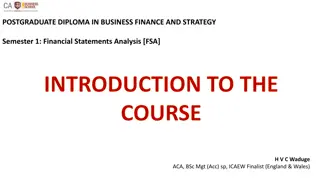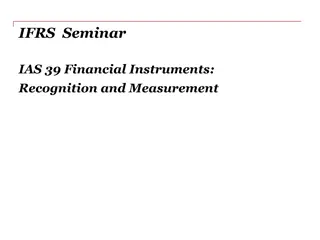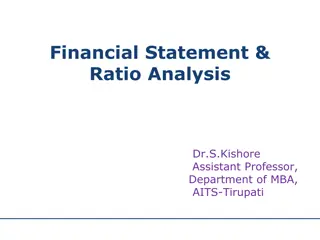Understanding Financial Management Principles
Financial management involves planning, organizing, controlling financial resources, and finding sources for raising funds. It includes functions such as estimating financial requirements, decision-making on capital structure and investment, cash management, and financial controls. The main objectives of financial management are profit maximization and wealth maximization. It plays a crucial role in maximizing economic welfare for shareholders by providing a framework for commercial strategies.
Download Presentation

Please find below an Image/Link to download the presentation.
The content on the website is provided AS IS for your information and personal use only. It may not be sold, licensed, or shared on other websites without obtaining consent from the author. Download presentation by click this link. If you encounter any issues during the download, it is possible that the publisher has removed the file from their server.
E N D
Presentation Transcript
FINANCIAL MANAGEMENT Syed Muhammad Majid Shah Lecturer QACC
Financing means the provision of money at the time when it is required Financial management is: Concerned with the planning & controlling of firm s financial resources and to find various sources for raising further funds for the firm INTRODUCTION The application of the general management principles in the area of financial decision-making The art of planning; organizing, directing and controlling of the funds and safe disposal of profits The art and science of managing money
Business Finance OR Corporate Finance Money Markets Financial Management Financial Markets Capital Markets Financial Economics (Studies the Financial System) Financial Institutions Banking Institutions Economics Finance Financial Instruments Non-Banking Institutions Security Analysis Investments Portfolio Theory Personal Finance Market Analysis Public Finance Behavioral Finance
FUNCTIONS OF FINANCIAL MANAGEMENT Estimating Financial Requirements Deciding Capital Structure Selecting a Source of Finance Selecting a Pattern of Investment Proper Cash Management Implementing Financial Controls Return on Investment, Ratio analysis, Break Even Analysis, Cost Control, Audit Proper use of Surpluses
Functions of Financial Management Financing Decision Investment Decision Dividend Decision Liquidity Decision Analysis of Risk/Return for achieving these Goals/Objectives: Profit Wealth Maximization Maximization
GOALS/OBJECTIVES OF FINANCIAL MANAGEMENT The main objective of a business is to maximize the owner s economic welfare Financial management of a firm helps maximize economic welfare of is shareholders by providing a framework for selecting a commercial strategy There are two versions of the main goal of financial management: Profit maximization Wealth maximization The functions of FM are directed toward achieving the above goals
WEALTH MAXIMIZATION Financial theory asserts that the wealth maximization is the single MAIN substitute for stakeholders utility When the firm maximizes the shareholders wealth, the individual stakeholders can use this wealth to maximize his individual utility Stockholder s current wealth in the firm Number of shares owned Current stock price per share Maximi ze Stock Price Maximize Stakehold er Wealth Refers to Result s in Maximu m Utility
Economic Environment Economic activity, Tax rates Management Decisions Competition, Business conditions Products & Services, Technology Shareholder s Wealth Capital structure, Dividend Policy Market Price of the Stock Financial Markets Interest rates, Inflation Amount, Timing, Risk of expected Cash Flow
CHIEF FINANCIAL OFFICER CFOs play an important role in ensuring proper reporting based on substance to the stakeholders of the company. CFO reports to BODs. Under CFO,normally two senior officers normally operate: Treasurer Controller/Comptroller Obtaining required finance Accounting and Auditing Liaison with term lending and other financial institutions Management control systems Taxation and insurance Managing working capital Budgeting and performance evaluation Managing investment in real assets Maintaining assets intact to ensure higher productivity
FINANCE AND OTHER BUSINESS FUNCTIONS Finance And Accounting The purpose of accounting is to report the financial performance of the business for the period under consideration. Financial analysis is carried out on basis of accounting Accounting is historical in nature, while FM uses this to make future oriented decisions Finance And Marketing Channels of distribution, advertisement policy, remunerating the salesmen etc.have financial implications Marketing cost analysis is a function of finance managers Credit management and credit terms for increasing sales
FINANCE AND OTHER BUSINESS FUNCTIONS Finance And Productions (Operations) Decisions on plant layout,technology selection, productions / operations, process plant size etc. Capital Budgeting is closely related to productions Inventory management involves many financial variables Finance And HR Attracting and retaining the best man power in the industry cannot be done unless they are paid salary at competitive rates The better the quality of manpower, the higher the value of the human capital and consequently the higher the productivity of the organization
THE MODERN CORPORATION Modern Corporation Shareholders Management There exists a SEPARATION between owners and managers.
ROLE OF MANAGEMENT Management acts as an agent for the owners (shareholders) of the firm. An agent is an individual authorized by another person, called the principal, to act in the latter s behalf.
AGENCY THEORY Jensen and Meckling developed a theory of the firm based on agency theory. Agency Theory is a branch of economics relating to the behavior of principals and their agents.
AGENCY THEORY Principals must provide incentives so that management acts in the principals best interests and then monitor results. Incentives include, stock options, perquisites, and bonuses.
CORPORATE SOCIAL RESPONSIBILITY Wealth maximization does not prohibit the firm from being socially responsible at the corporate level. Assume we view the firm as producing both private and social goods. Then shareholder wealth maximization remains the appropriate goal in governing the firm.
CORPORATE GOVERNANCE Corporate governance: represents the system by which corporations are managed and controlled. Includes shareholders, board of directors, and senior management. Then shareholder wealth maximization remains the appropriate goal in governing the firm.
FINANCIAL ENVIRONMENT Businesses interact continually with the financial markets. Financial Markets are composed of all institutions and procedures for bringing buyers and sellers of financial instruments together. The purpose of financial markets is to efficiently allocate savings to ultimate users.
FLOW OF FUNDS IN THE ECONOMY INVESTMENT SECTOR INTERMEDIARIES FINANCIAL FINANCIAL BROKERS SECONDARY MARKET SAVINGS SECTOR
FLOW OF FUNDS IN THE ECONOMY INVESTMENT SECTOR INVESTMENT SECTOR INTERMEDIARIES FINANCIAL Businesses FINANCIAL BROKERS Government SECONDARY MARKET Households SAVINGS SECTOR
FLOW OF FUNDS IN THE ECONOMY INVESTMENT SECTOR SAVINGS SECTOR INTERMEDIARIES FINANCIAL Households FINANCIAL BROKERS Businesses SECONDARY MARKET Government SAVINGS SECTOR
FLOW OF FUNDS IN THE ECONOMY INVESTMENT SECTOR FINANCIAL BROKERS INTERMEDIARIES FINANCIAL Investment Bankers FINANCIAL BROKERS Mortgage Bankers SECONDARY MARKET SAVINGS SECTOR
FLOW OF FUNDS IN THE ECONOMY INVESTMENT SECTOR FINANCIAL INTERMEDIARIES INTERMEDIARIES FINANCIAL Commercial Banks Savings Institutions Insurance Cos. Pension Funds Finance Companies Mutual Funds FINANCIAL BROKERS SECONDARY MARKET SAVINGS SECTOR
FLOW OF FUNDS IN THE ECONOMY INVESTMENT SECTOR SECONDARY MARKET INTERMEDIARIES FINANCIAL Security Exchanges FINANCIAL BROKERS OTC Market SECONDARY MARKET SAVINGS SECTOR
ALLOCATION OF FUNDS Funds will flow to economic units that are willing to provide the greatest expected return (holding risk constant). In a rational world, the highest expected returns will be offered only by those economic units with the most promising investment opportunities. Result: Savings tend to be allocated to the most efficient uses.
























